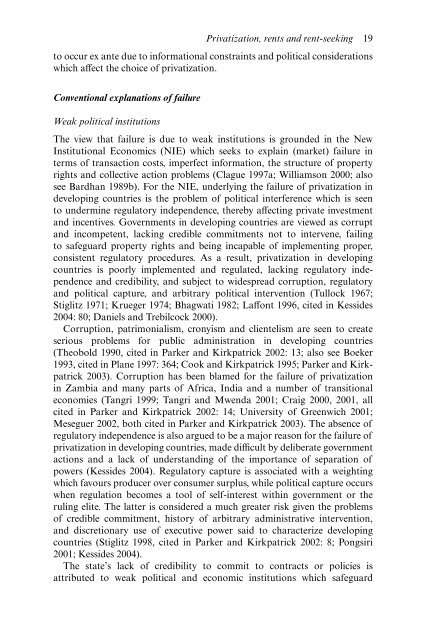PRIVATIZATION Privatization in Malaysia, Regulation, rent-seeking and policy failure
PRIVATIZATION Privatization in Malaysia, Regulation, rent-seeking and policy failure
PRIVATIZATION Privatization in Malaysia, Regulation, rent-seeking and policy failure
You also want an ePaper? Increase the reach of your titles
YUMPU automatically turns print PDFs into web optimized ePapers that Google loves.
<strong>Privatization</strong>, <strong>rent</strong>s <strong>and</strong> <strong>rent</strong>-seek<strong>in</strong>g 19to occur ex ante due to <strong>in</strong>formational constra<strong>in</strong>ts <strong>and</strong> political considerationswhich affect the choice of privatization.Conventional explanations of <strong>failure</strong>Weak political <strong>in</strong>stitutionsThe view that <strong>failure</strong> is due to weak <strong>in</strong>stitutions is grounded <strong>in</strong> the NewInstitutional Economics (NIE) which seeks to expla<strong>in</strong> (market) <strong>failure</strong> <strong>in</strong>terms of transaction costs, imperfect <strong>in</strong>formation, the structure of propertyrights <strong>and</strong> collective action problems (Clague 1997a; Williamson 2000; alsosee Bardhan 1989b). For the NIE, underly<strong>in</strong>g the <strong>failure</strong> of privatization <strong>in</strong>develop<strong>in</strong>g countries is the problem of political <strong>in</strong>terference which is seento underm<strong>in</strong>e regulatory <strong>in</strong>dependence, thereby affect<strong>in</strong>g private <strong>in</strong>vestment<strong>and</strong> <strong>in</strong>centives. Governments <strong>in</strong> develop<strong>in</strong>g countries are viewed as corrupt<strong>and</strong> <strong>in</strong>competent, lack<strong>in</strong>g credible commitments not to <strong>in</strong>tervene, fail<strong>in</strong>gto safeguard property rights <strong>and</strong> be<strong>in</strong>g <strong>in</strong>capable of implement<strong>in</strong>g proper,consistent regulatory procedures. As a result, privatization <strong>in</strong> develop<strong>in</strong>gcountries is poorly implemented <strong>and</strong> regulated, lack<strong>in</strong>g regulatory <strong>in</strong>dependence<strong>and</strong> credibility, <strong>and</strong> subject to widespread corruption, regulatory<strong>and</strong> political capture, <strong>and</strong> arbitrary political <strong>in</strong>tervention (Tullock 1967;Stiglitz 1971; Krueger 1974; Bhagwati 1982; Laffont 1996, cited <strong>in</strong> Kessides2004: 80; Daniels <strong>and</strong> Trebilcock 2000).Corruption, patrimonialism, cronyism <strong>and</strong> clientelism are seen to createserious problems for public adm<strong>in</strong>istration <strong>in</strong> develop<strong>in</strong>g countries(Theobold 1990, cited <strong>in</strong> Parker <strong>and</strong> Kirkpatrick 2002: 13; also see Boeker1993, cited <strong>in</strong> Plane 1997: 364; Cook <strong>and</strong> Kirkpatrick 1995; Parker <strong>and</strong> Kirkpatrick2003). Corruption has been blamed for the <strong>failure</strong> of privatization<strong>in</strong> Zambia <strong>and</strong> many parts of Africa, India <strong>and</strong> a number of transitionaleconomies (Tangri 1999; Tangri <strong>and</strong> Mwenda 2001; Craig 2000, 2001, allcited <strong>in</strong> Parker <strong>and</strong> Kirkpatrick 2002: 14; University of Greenwich 2001;Meseguer 2002, both cited <strong>in</strong> Parker <strong>and</strong> Kirkpatrick 2003). The absence ofregulatory <strong>in</strong>dependence is also argued to be a major reason for the <strong>failure</strong> ofprivatization <strong>in</strong> develop<strong>in</strong>g countries, made difficult by deliberate governmentactions <strong>and</strong> a lack of underst<strong>and</strong><strong>in</strong>g of the importance of separation ofpowers (Kessides 2004). Regulatory capture is associated with a weight<strong>in</strong>gwhich favours producer over consumer surplus, while political capture occurswhen regulation becomes a tool of self-<strong>in</strong>terest with<strong>in</strong> government or therul<strong>in</strong>g elite. The latter is considered a much greater risk given the problemsof credible commitment, history of arbitrary adm<strong>in</strong>istrative <strong>in</strong>tervention,<strong>and</strong> discretionary use of executive power said to characterize develop<strong>in</strong>gcountries (Stiglitz 1998, cited <strong>in</strong> Parker <strong>and</strong> Kirkpatrick 2002: 8; Pongsiri2001; Kessides 2004).The state’s lack of credibility to commit to contracts or policies isattributed to weak political <strong>and</strong> economic <strong>in</strong>stitutions which safeguard


